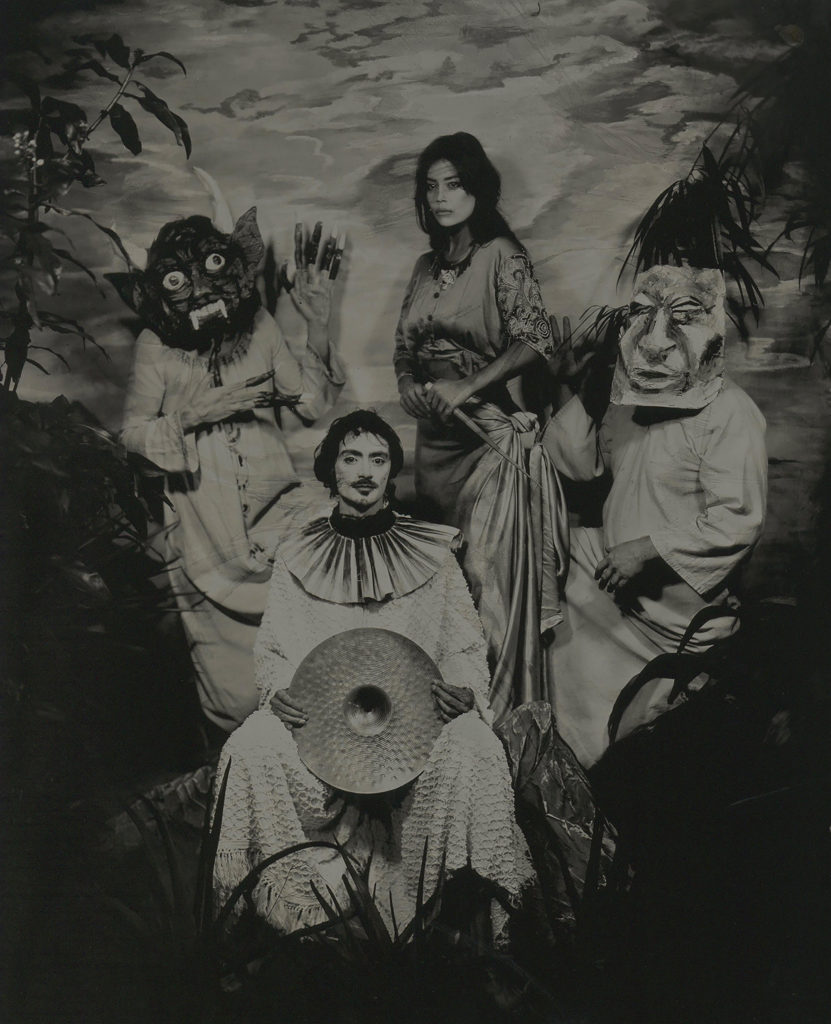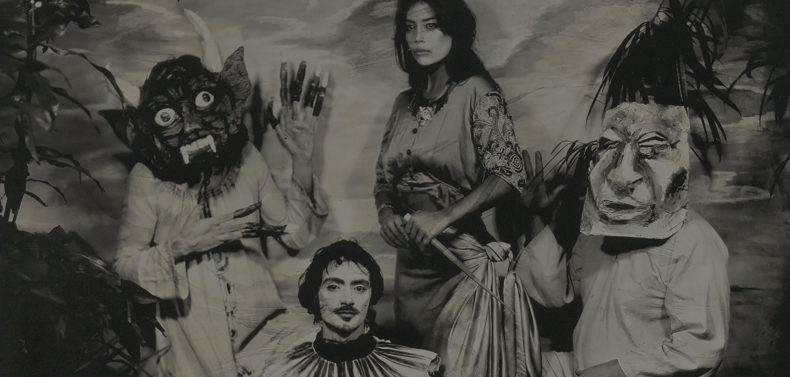Psychedelic in the most cerebral sense, Immaterial Possession’s self-titled debut album is a darkly entrancing art-pop stunner that eerily shapeshifts through dreamlike meanderings.
Guided by a DIY punk ethos, members Cooper Holmes (bass, vocals), Madeline Polites (guitar, vocals), John Spiegel (percussion) and Kiran Fernandes (keyboards, woodwinds) lead a hallucinatory journey that is equally visual and auditory. In the absence of touring to support the album, which was released on Cloud Recordings, the band pivoted its focus into creating a series of accompanying short films.
With a heavy emphasis on optical illusions, narrative ambiguity and handcrafted elements, these brief films harness an ability to manipulate perceptions of space, dimension and reality—with the permission and participation of the viewer’s imagination. Sharing aesthetic qualities with Dadaist, Surrealist and avant-garde filmmakers like Fernand Léger, Luis Buñuel and Maya Deren, the band’s short films reach backward through time to engage a pre-digital type of human magic.
The black-and-white music video for the album’s opening track, “Midnight Wander,” could have been teleported from this era of early experimental cinema. Shot on Super 8 film, the opening scene depicts Polites plucking the strings of a wide-eyed David McCracken, who is costumed to resemble a guitar and calls to mind Man Ray’s “Le Violon d’Ingres.” Contrasting darkened eyebrows and lips against white face paint, traditional for silent film actors, Holmes sings out from behind a screen as limbs progressively appear, a detail reminiscent of a scene from Jean Cocteau’s Blood of a Poet.
Art history comparisons aside, where “Midnight Wander” becomes inimitable is through its world-building of hand-painted sets and paper mache characters, including the wicked yet playful devil who appears on Flagpole’s cover this week. Here, we observe the mark of Peepa Show, a separate but overlapping avant-garde performance troupe that consists of Holmes, Polites and Fernandes. Elements of abstract theater, puppetry, costumery and animation invite a suspension of disbelief that leads to a deepened sense of wonder.
“One thing often on my mind is when I find myself viewing a high-definition TV, I wonder why they wanted to make it so crystal clear that I can see into their pores,” says Polites. “The magic illusion of the screen is lost, and the details become distracting from the substance. We need that subtle fuzz and glow to quiet our reality-deciphering brains. This is the abstract field where the magic happens. The fuzz and glow is the art aura! It’s nice when you can just relax into the imagination of it.”
Bathed in warm yellow light that splinters into glimmering, honeycombed rainbows as if filmed from within a crystal prism, the music video for “Tropical Still Life” is an altogether different landscape from that of “Midnight Wander.” Though the musicians’ silhouettes are grounded among the lush palms and old tombstones of Savannah, that plane is transcended as the viewer is dipped into the world of a shamanic figure wearing a golden mask. Directed by Jason Thibodeaux of Portland-based production team The Hand And The Shadow, the video visually suggests the possibility of some sort of divine intervention as Polites lyrically explores the double entendre of finding animation in a still-life (stationary object) or still life (stagnant person).
For “See Through Stares,” one of the album’s tenderest and most melancholic melodies, Super 8 ektachrome immortalizes Polites as she twirls through empty rooms accented by sunny windows, giant mirrors and crystal chandeliers. With an idyllic courtyard full of ivy and pink roses, it’s a house that feels romantic and hallowed, steeped in memory despite its dormancy.
The setting is 368 Ponce, a historic mansion in Midtown Atlanta that Holmes helped launch and operate for a decade or so as a communal home for artists, activists and travelers that doubled as a DIY venue for endeavors not limited to art, theater, music, yoga, film and skill-sharing. 368 Ponce continued in this incarnation for several more years before facing the fate that inevitably plagues most eclectic properties within rapidly urbanizing communities.
“Eventually with the area becoming gentrified, and burnout from the burden of managing such a giant old space with so many costly needs, 368 ended up folding and going up for sale,” says Holmes. “Madeline and I, both having spent many formative years there, viewed shooting the film as a kind of eulogy for the space to capture the building’s 100-year-old majesty.”
Years before relocating to Athens or reconnecting to start a band, Holmes and Polites had both resided at 368 Ponce and had worked together on housemate S. Bedford’s “Oh! Fearsome Head!,” a trilogy of complex plays that involved long monologues, a live band, costume changes and elaborate scenery. This experience, combined with visits by the incredible Puerto Rican performance collective Poncili Creación, opened a gateway into a new realm of creative possibility for both artists. After briefly participating in an improv theater troupe, but desiring something more Dadaist in nature, Holmes discovered Cal Clements’ clown school through Rubber Soul Yoga Revolution. The clowning techniques developed through this transformative program were then incorporated as Peepa Show began taking root.
“Clowning exercises some deep part of myself that is hidden most of the time and allows for free flow expression of fundamental emotions and needs,” says Holmes. “Clowning is able to distill down humanistic emotions and desires to purer forms, similar to watching a toddler or a dog, everything is bare and written on the face. We as adults (mostly) have grown wise to disguise our toddler forms and keep our real motives and fears under wraps. Someone clowning can access this shared pool of hidden emotion by openly accepting the role of The Fool or outcast that everyone is scared of becoming. Taking the embarrassment for the team can somehow relieve a pressure valve for the audience and reflect to them that their own folly and troubles are not unique. This of course is only when it works…”

Call them what you will—clown, fool, jester—but this archetypal character has appeared across cultures and throughout centuries to fulfill essential roles as entertainers and storytellers. Whether through song, acrobatics, jokes or magic, these individuals bring brightness and lightness into the lives of the audience. In Tarot, The Fool—typically depicted as a person stepping confidently off of the edge of a cliff—can symbolize spontaneity, new beginnings, risk-taking and unlimited potential. Polites similarly taps into this free-spirited playfulness.
“I’m not sure if I knew at the time that this was what was going on, but performing surfaced through out high school,” says Polites. “I’m not talking about any theater department—I’m talking class clownery. I was utterly depressed during those years, but simultaneously thrived off being The Fool. Everything turned to absurdity under the florescent public school hellscape. It was one way to endure the chaos of high school depression.”

Released Feb. 10, Immaterial Possession’s newest film, “Phases,” stitches together a fitting instrumental soundtrack out of the album’s three improvisational interludes—“Phase One,” “Phase Two” and “Circle of Bells”—that sound endearingly wonky when standing between such gorgeous tracks, yet transmit an important level of playfulness and vulnerability that pure, unpolished jamming should imbue. Initially created as part of Lisa Yaconelli’s Small Box Series—Holmes and Polites first appear in Bauhaus Ballet-like costumes on a 4-foot-by-4-foot stage—the production was lengthened to include a chapter that showcases S. Bedford’s three-dimensional sculpture.
Currently, Immaterial Possession is already working on recording new music and filming an additional three videos. Tangentially, Peepa Show looks forward to producing an outdoor performance in late spring or early summer as part of an Arts in Community Resilience Award from the Athens Cultural Affairs Commission. No matter the medium, Immaterial Possession and Peepa Show both remind us to value the creative process, not just the product—to explore the shadowy corners of our psyche, and to invite the archetypal Fool out to play.
Below, watch the sparkling new short film, “Phases.”
Like what you just read? Support Flagpole by making a donation today. Every dollar you give helps fund our ongoing mission to provide Athens with quality, independent journalism.










